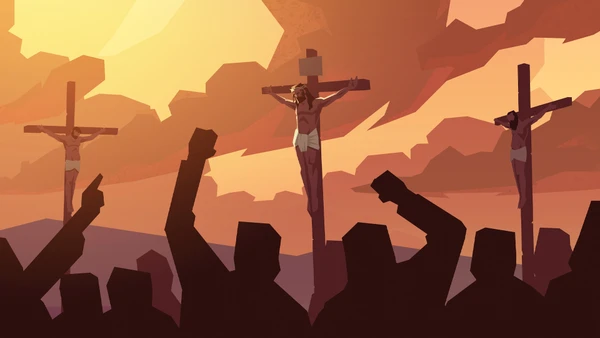The picture of redemption found in Genesis 22:1-14 is unsettling. God tells Abraham to go to the region of Mount Moriah and sacrifice his son Isaac.
Some time later God tested Abraham. He said to him, “Abraham!” “Here I am,” he replied. Then God said, “Take your son, your only son, whom you love – Isaac – and go to the region of Moriah. Sacrifice him there as a burnt offering on a mountain I will show you.”
Genesis 22:1-2
Today, we are repulsed by the idea of sacrificing an animal. Sacrificing a child is infinitely worse. But in Abraham’s time and place, and indeed throughout the world at that time, child sacrifice was common. (To better understand sacrifice in the ancient world and in the Bible, see “My Attempt to Come to Grips with Sacrifice” at the end of this topic.)
Early the next morning Abraham got up and loaded his donkey. He took with him two of his servants and his son Isaac. When he had cut enough wood for the burnt offering, he set out for the place God had told him about. On the third day Abraham looked up and saw the place in the distance. He said to his servants, “Stay here with the donkey while I and the boy go over there. We will worship and then we will come back to you.”
Genesis 22:3-5
Abraham tells his servants that he and Isaac will both be returning. God had already promised that Isaac would become a great nation and that he would establish an everlasting covenant through Isaac. Abraham had learned that God’s promises could be trusted, so he must have had faith that this would not be the end of the story for Isaac.
Abraham took the wood for the burnt offering and placed it on his son Isaac, and he himself carried the fire and the knife. As the two of them went on together, Isaac spoke up and said to his father Abraham, “Father?” “Yes, my son?” Abraham replied. “The fire and wood are here,” Isaac said, “but where is the lamb for the burnt offering?” Abraham answered, “God himself will provide the lamb for the burnt offering, my son.” And the two of them went on together.
Genesis 22:6-8 NIV
In the NIV translation, Abraham tells Isaac “God himself will provide the lamb for the burnt offering, My Son.” But many scholars think the King James and Revised Standard versions come closer to the original Hebrew: “God will provide himself a lamb for the offering”. God was showing Abraham and us an important picture of his plan for our salvation. God would provide himself as the offering required.
When they reached the place God had told him about, Abraham built an altar there and arranged the wood on it. He bound his son Isaac and laid him on the altar, on top of the wood. Then he reached out his hand and took the knife to slay his son. But the angel of the LORD called out to him from heaven, “Abraham! Abraham!” “Here I am,” he replied. “Do not lay a hand on the boy,” he said. “Do not do anything to him. Now I know that you fear God, because you have not withheld from me your son, your only son.” Abraham looked up and there in a thicket he saw a ram caught by its horns. He went over and took the ram and sacrificed it as a burnt offering instead of his son.
Genesis 22:9-13 NIV
Of course, God never intended for Isaac to die. He stopped Abraham in time, just as Abraham trusted that he would, and provided a ram in Isaac’s place. God asked Abraham and Isaac to “act out” this living parable. Despite all the pain they both had to endure, in the end they both witnessed God’s faithfulness firsthand.
So Abraham called that place The LORD Will Provide. And to this day it is said, “On the mountain of the LORD it will be provided.”
Genesis 22:14 NIV

In fact, about 2000 years later, the Lord did provide himself as the sacrifice, in the very same region of Mount Moriah. By then, Jerusalem had been built and Mount Moriah had been renamed Mount Calvary.
Abraham was able to obey God because he had faith that God could be trusted.
By faith Abraham, when God tested him, offered Isaac as a sacrifice. He who had embraced the promises was about to sacrifice his one and only son, even though God had said to him, “It is through Isaac that your offspring will be reckoned.” Abraham reasoned that God could even raise the dead, and so in a manner of speaking he did receive Isaac back from death.
Hebrews 11:17-19 NIV
Often, living parables don’t make sense until after Jesus. Jesus says about this glimpse of the future Abraham was allowed to see:
“Your father Abraham rejoiced at the thought of seeing my day; he saw it and was glad.”
John 8:56
Abraham’s living parable was always pointing ahead to the day when God would provide himself, in the person of Jesus, to be our redemptive offering. What started out looking like a tragedy turned into a parable about faith and faithfulness – Abraham’s faith and God’s faithfulness.
Facets of Redemption Found in this Picture:
- God will provide himself as the sacrificial offering required for our redemption.
- Abraham was faithful to the mission God had given him, even though it was painful. God will be faithful to his mission to redeem the world.
- Abraham’s faith and trust in God led to redemption. “Abraham believed God, and it was counted to him as righteousness.”